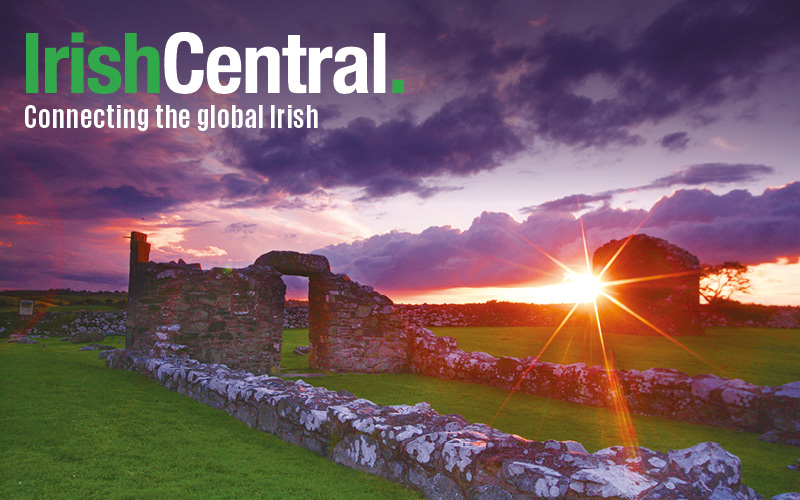In New Jersey, I know what I am, and so does mostly everyone else. It’s easy, sure, I’m Irish. (Again, the name pretty much gives it away). In America you can be Irish, German, Italian, Polish, this or that or some exotic mix of them all. It’s only in rare cases do you find someone who identifies as simply “American”.
But as I’ve travelled between New Jersey and Ireland, as well as a few other European countries, the question ‘What are you?’ has come up here and there. Meaning, of course, what nationality am I?
Perhaps my earliest encounter with such a discussion was when I was still in elementary school and had to get measured for a uniform for the following year. Standing in line, my name was eventually called up by the tailor. When I got up to the front to have my measurements taken, the tailor asked, “Kerry O’Shea...Polish, right?”
I looked up at him with my childish naivete, confused and astounded all at once. Did he really think I was Polish with a name like Kerry O’Shea?
“No, I’m Irish! My dad’s from Ireland!”
-------------------
READ MORE:
Mommy Diaries: Busy mom forgets she’s pregnant as toddler is a 24-7 job
Top ten things to dislike about Irish women
One thousand famine victims found in Irish burial site
-------------------
Evidently he didn’t expect me to be so baffled at his honest joke and laughed in response saying “Oh, you almost had me!” Nowadays, I would joke along and just say, ‘Yes, very Polish.’
Growing up in a small town in New Jersey, I was always known as one of the “Irish” kids. Having a parent from a different country can be sort of a novelty for other kids born to American parents. Young kids meeting my dad and hearing his Irish accent can be thrown off at times, but are always intrigued.
I spent a solid 15 years competitively Irish dancing, so every year for talent shows I was up on stage doing a reel or whatnot. St. Patrick’s Day was an obligatory day off from school, mainly because I was making runs around town to do different performances. I had, literally, the opportunity to put my heritage on display throughout my youth. (Which, of course, doesn’t mean to imply that all Irish dancers are Irish and only Irish, but that’s a whole other discussion.)
In high school, I found my closest friends to be of similar heritage; they were mostly children of one or more immigrants from Ireland. I suppose you could chalk it up to the fact that we had an inherent understanding of each other. We were “the Irish kids,” and all of our parents were friends or, at the very least, acquaintances from when they had first moved to the US when they were younger. Our parents encountered an almost instant sense of community that lingers on today amongst Irish immigrants.
The question of my nationality was first posed seriously to me when I was at my internship in Dublin, where I studied abroad during my junior year of college. “So, do you consider yourself Irish or American?” my supervisor, a man from Cork, asked.
It was an interesting question for me, and probably the first time that anyone seriously questioned me as to what nationality I was. It had always been abundantly clear that I was Irish, at least in New Jersey anyway.
I realized it was a matter of location. “Well, at home I’m Irish. But here in Ireland, I’m American I guess, even though all of my family’s from Ireland.” I went on to explain how my dad’s from Kerry, and that although my mother was born in New York, her parents are from Galway and Mayo. The Corkman replied with a chuckle, “Jesus you’re nearly more Irish than me!” before he again slid into his joking (but probably not-so-joking) tirade of how there’s nothing in the world he hates more than a Kerryman, a rivalry I’m well familiar with.
As I’ve gotten older, I’ve also come to understand that there are varying degrees of what is considered Irish in America, and how Irish-born perceive that. You have the families like mine, where we embrace our heritage, mostly because we know no other way. We can point out directly where our lineage comes from. Then there are those who thrust themselves into the identification of Irish because, while they may have only some familial connections to Ireland, they are attracted to the degree of trendiness that is sometimes associated with being Irish in America today.
And then there are those who I believe are attracted to the sense of community that being Irish offers. They may have little to no concrete connections to Ireland, but still want to identify with the culture. With Irish being one of the largest populations worldwide, you’re sure to find some Irish influence at any corner of the globe, a sense of comfort for some I presume.
I believe that’s one of the reasons why one’s heritage is often put to question, especially in Ireland. I have the feeling that Irish people, in Ireland, are acutely aware of those who come to Ireland claiming that they’re “Irish,” but could hardly tell the difference between Dublin and Galway.
But that’s not to say that one degree of Irish is better than another, either. It’s one thing to say you’re Irish, and it’s another to be Irish. I myself claim to be Irish, but that claim was challenged by some Irish-born while I was living in Dublin. Ultimately, it really is your location that defines it.
So, what are you?
-------------------
READ MORE:
Mommy Diaries: Busy mom forgets she’s pregnant as toddler is a 24-7 job
Top ten things to dislike about Irish women
One thousand famine victims found in Irish burial site
-------------------




Comments